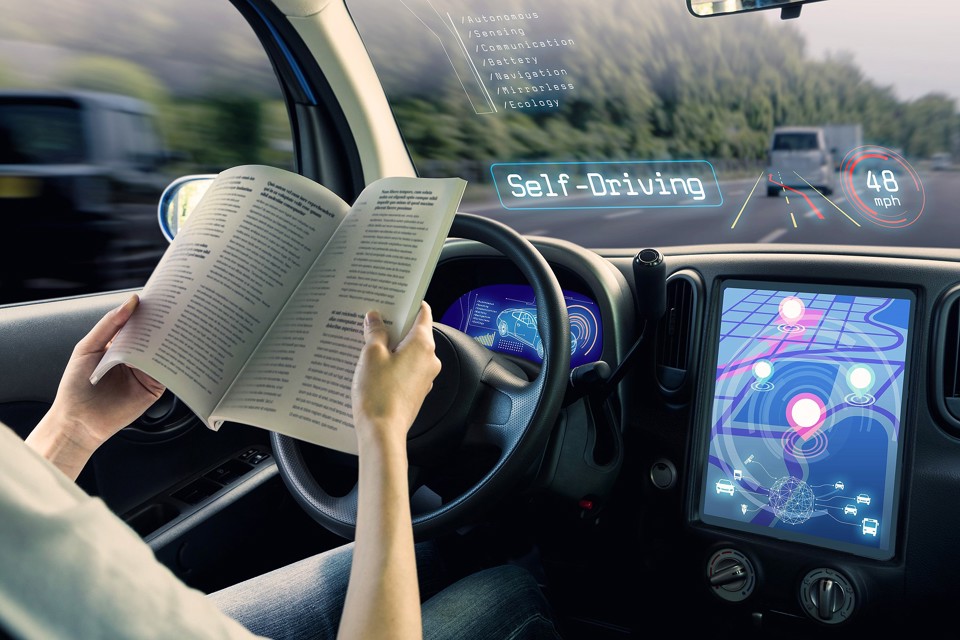There could be self-driving cars on UK roads by 2025 if the government's plans come to fruition, backed by a £100 million budget to prioritise safety through new laws and developments.
It predicts that 38,000 new jobs could be created from a UK self-driving technology sector which could be worth £42 billion to the economy.
Its £100m fund includes £34m for research to support safety developments, such as research into how to prevent poor weather conditions interfering with systems interacting with pedestrians and other road users, and to inform the more detailed legislation which will be needed.
Another £20m of the total £100m was confirmed today to help kick-start commercial self-driving services, such as delivery services and airport shuttles, and enable businesses to grow and create jobs in the UK.
Some vehicles, including cars, coaches and lorries, with self-driving features could be operating on motorways in the next year.
The government announcement comes as the Centre for Data Ethics and Innovation (CDEI) publishes its Responsible Innovation in Self-Driving Vehicles report, which sets out proposals for a trustworthy approach to the regulation and governance of self-driving vehicles.
The report warns that it might not be enough for self-driving cars to be safer than normal cars, and says the public may have little tolerance for driverless car crashes, even if these systems are safer on average.
AA president Edmund King said: “It is important that the Government does study how these vehicles would interact with other road users on different roads and changing weather conditions.
“However, the ultimate prize, in terms of saving thousands of lives and improving the mobility of the elderly and the less mobile, is well worth pursuing.”
Vehicles that can drive themselves on motorways could be available to purchase within the next year, which users would need a valid driving licence for, so they can drive on other roads.
The Department for Transport said other self-driving vehicles, for example used for public transport or delivery, expected on the roads by 2025, would not need anyone onboard with a driving licence because they would be able to drive themselves for the whole journey.
Transport secretary Grant Shapps said: “The benefits of self-driving vehicles have the potential to be huge.
“Not only can they improve people’s access to education and other vital services, but the industry itself can create tens of thousands of job opportunities throughout the country.
“Most importantly, they’re expected to make our roads safer by reducing the dangers of driver error in road collisions.
“We want the UK to be at the forefront of developing and using this fantastic technology, and that is why we are investing millions in vital research into safety and setting the legislation to ensure we gain the full benefits that this technology promises.”
The Government has launched a consultation on a ‘safety ambition’ for self-driving vehicles to be as safe as a competent and careful human driver.
This ambition would inform standards that vehicles need to meet to be allowed to ‘self-drive’ on the roads, and organisations, such as manufacturers, could face sanctions if standards are not met.
New laws will build on existing laws, and state that manufacturers are responsible for the vehicle’s actions when self-driving, meaning a human driver would not be liable for incidents related to driving while the vehicle is in control of driving.
Jonathan Hewett, chief executive of Thatcham Research, welcomed the “breadth of the Government’s ambition” in positioning the UK as a centre for self-driving innovation, along with the safety-first approach.
“Ensuring that safe adoption is at the centre of its plans will play a pivotal role in realising the societal benefits of self-driving technology,” he said.
“The cars we drive are changing at an unprecedented rate. But the automotive industry is still at the lower end of a steep learning curve.
“It’s vital that we balance the risk with the opportunity, gathering intelligence on the different use cases for the technology and in turn understanding what it means for all road users.”
He added: “All the ingredients are present for the UK to become a global leader in this space. However, it is paramount that we make sense of the data these vehicles will provide, to inform risk and ultimately pave the way for safe adoption.
“Any challenges encountered by vehicles with self-driving capability will be heavily scrutinised. Complete clarity around the driver’s legal responsibilities, along with how the technology is marketed, how the dealer describes systems when handing over the keys and how the self-driving system itself communicates with the driver, will play its part too.
“As such, collaboration between Government, regulators, carmakers and the insurance industry will be essential to creating a safe system for adoption and the age of humankind interacting with autonomous technology.”





















Login to comment
Comments
No comments have been made yet.